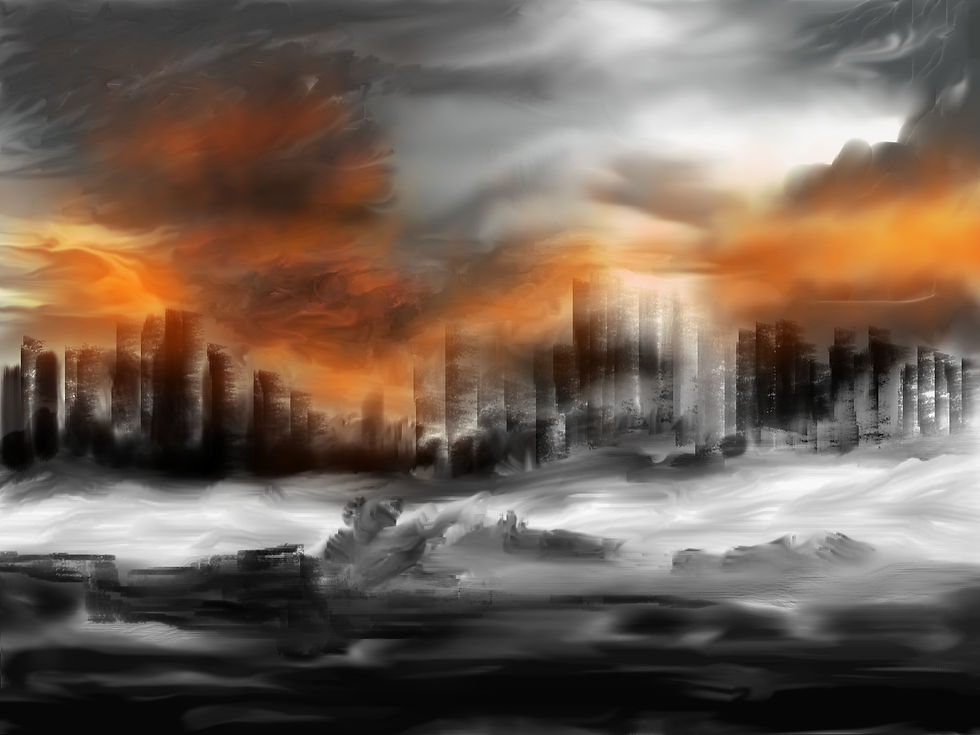Associate Professor,
Department of Theater, Dance,
and Performance Studies
UC Berkeley

THEATERS OF APOCALYPSE
2018
FALL
Introduction
Welcome to the class e-zine on Theaters of the Apocalypse, an undergraduate class at the University of California Berkeley offered by Professor Angela Marino in the Department of Theatre, Dance, and Performance Studies. This is a site that brings to culmination a semester-long study on the intersections of performance and transcultural apocalyptic traditions in the American hemisphere.
From zombie pop fiction to an incessant roll of high budget movies primarily produced in the United States, we in America are bombarded with fantasies of apocalypse. Mostly they take the form of impending doom from natural disaster or alien invasions. Other times they are linked to heroes and and anti-heroes challenged by foes or facing their own destructive powers. More rarely, we see ordinary people delinking the mythos of apocalyptic crisis, and in their own way, finding alternatives.
Perhaps with astonishing regularity, we watch the apocalyptic fervor rise and fall in mainstream media. We might attribute this to what anti-fascist thinkers coming out of world war two considered to be the culture industry, where "[t]he entire practice of the culture industry transfers the profit motive naked onto cultural forms" (Adorno 1991). Desire for crisis means profits for the industry. Cultural forms reproduce the apocalypse because people buy it time and again. Yet, we must ask deeper questions about whose culture is reproduced through these repeating transactions, and what else might people desire (or need) through their consumption of apocalyptic storytelling.
We began the course with asking these questions in an attempt to deconstruct the myth of desire that accompanies apocalypse fictions (and to realize that we were collectively over it, and staggeringly ready for new stories to tell!). Nevertheless, we studied its origins, the etymology of the word itself, and the multiple stages of its development in the Judeo-Christian tradition. We analyzed different popular meanings of the term (i.e. the end, catastrophe, and others), and contrasted those meanings between the Millenarian and Mexica-Mayan philosophy of time, being, and death in theatre, film, popular media, and performance art.
Our aim was to gain a critical understanding of the historical and political dimensions of thought around the idea of an "end of times," along with transcendence, revelation, and renewal as it intersects with theater and performance of our time. We reached these through several big questions that we devised through the course materials that became the prompts for final essay and presentation projects in class. We welcome your presence on this site to think with us about these questions to restore hope in the brave world we can become.

Big questions in final projects
Hover over for each for the fuller question prompt.
Death and Return:
Back to the Bones
Recognizing that the apocalyptic tradition attempts to prophesize what orders the living and the dead, how does this tradition bear on the issue of reparations regarding the Ohlone ancestral bones and the Hearst Museum? What ways does an embrace (strategically or otherwise), revision, or refusal of specific apocalyptic traditions (or imaginations) around death, eschatology, and renewal, help to uncover the larger issues on campus dealing with knowledge production, geo-cultural space, and power?
Will the Revelation Revolution
be
Televised?
This prompt asks for an analysis of a performance in screen based media, to ask the question: is this media enabling the kind of “revelations” that you think that we need in the world today? Or, with all of its hype, are we getting deluded into a false reality? Your answer need not fall neatly into a pro-tech or no-tech argument, but rather should grapple with questions of technology, community, production, and knowledge through any material that we have discussed in class.
Revelations and the New Order: At What Costs, and How to Find the Balance?
This prompt is a challenging one, asking you to weigh carefully the stakes of engaging with ideas of catastrophic change, the act of turning things upside down, or bringing people and histories back together in what could be considered a ‘new’ (or old) order. What can be gained, and how does that alter perspectives? This prompt allows you to move into an area of independent research on food production, social systems and migration, intergenerational relations, or climate change.
The organizing principles by which we live, must let me imagine…
This is a vision paper in which you are exercising your own creative capacities to imagine a future, and moreover, to suggest the organizing principles or logics of cultural production that must be in place in order for that future to materialize.